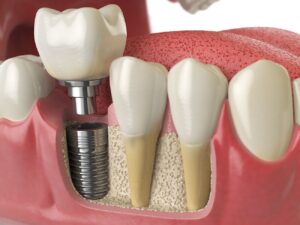Many people associate gum disease with inflammation and bleeding in the gum tissue. But as this oral infection progresses, bacteria will hurt your teeth and jawbone as well. This will leave you with severe dental damage that can cause teeth to fall out.
Gum disease is known as the leading cause of tooth loss. But after you treat gum disease, how can you replace your missing teeth? You can see the most comprehensive restorative benefits of tooth replacement using dental implants. But can you sustain these fixed dental prosthetics after the damage of gum disease?
Not all patients will qualify for implant dentistry. Read on to learn more about your eligibility for dental implants, especially if you lost teeth due to gum disease.

How Does Gum Disease Lead to Tooth Loss?
Gum disease will usually begin with swelling, soreness, and redness in the gum tissue as bacteria infects this part of the mouth and irritates the gums. Without prompt intervention to get rid of the infection, bacteria will spread.
This advanced stage of gum disease, periodontitis, affects the root of the teeth as well as the bone in the jaw. Bacteria will weaken and destroy these parts of the mouth irreversibly. Then the tooth can fall out of its socket.
Even if your dentist gets rid of the infection during this phase, the damage will remain, including the missing teeth. So you should not delay treatment for any issues you notice in your gums.
Will My Gums Support Dental Implants After Periodontal Disease?
If you lose a tooth, you should talk to your dentist to find a way to replace it. Tooth loss will leave you with many aesthetic, functional, and oral health complications, and dental implants make for ideal replacements for missing teeth.
But in the wake of gum recession and structural damage to the jaw from gum disease, you might not have a strong enough foundation to support a dental implant. The treatment involves surgically inserting a titanium post anchor into the jaw. It fuses with the bone there to ultimately support the prosthetic teeth.
Without enough healthy gum tissue or jawbone, the fusion cannot occur successfully. A dentist will assess the damage from gum disease to determine your eligibility for this treatment. They can evaluate your jawbone structure and health using x-ray imaging.
Can My Dentist Restore Gum Health to Sustain Dental Implants?
Even if you suffer extensive damage due to gum disease, implant dentistry is not completely out of the question for you to restore your smile after tooth loss. If your dentist treats gum disease and sees significant harm to your gums and jaw, they might suggest further treatment from a specialist to restore your oral health.
This could include a gum graft to add tissue and stability to your gums. They could also suggest a bone graft to build more structure to the jaw that could ultimately support a dental implant once healed. Schedule a consultation to learn if these treatments are feasible for you.
